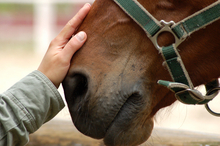Research Reflection by Juliet M. Getty, Ph.D.
Researchers from Ludwig-Maximilians-University in Munich, Germany[i] studied possible causes of the formation of fecal liquid in otherwise healthy horses. Fecal liquid (or fecal water, as the researchers denote it) is not diarrhea. Instead, horses afflicted with this condition have normally formed fecal balls, followed by excretion of water from the anus.

What's causing chronic fecal liquid production?
Researchers concluded that social stress appears to be a major cause of chronic fecal liquid production in horses.
Not only does this soil the tail and legs, but the excretion causes skin irritation and lesions. Fecal liquid production is not only unpleasant; it also deprives the horse of important minerals and electrolytes.
Forty-two affected horses participated in this study. Most of these horses had been suffering from fecal liquid formation for years. Their owners were asked to complete a questionnaire, which included questions on the ownersâ perceived status of the horse within its peer group hierarchy, as well as the presence of feed dominance where the horse would leave his food when another horse approached.
All of the affected horses were healthy, with no difference in fecal parasite larvae between those with fecal liquid and the control group. They were fed grass hay as their main source of forage as well as varying amounts of concentrated feeds. The majority of horses received a commercial vitamin/mineral supplement and a salt block. They all had similar access to water.
Results:
The major difference between the fecal liquid (FL) group and the control was the position within the hierarchy. Forty percent of the FL horses were considered to be last or second to last in the hierarchy compared to 4% in the control group. And even more striking was that 62% of the FL horses did not defend their food against other horses.
The researchers believe that psychosomatic effects cause a change in hormonal response, leading to altered gut peristalsis and frequency of defecation. They concluded that social stress appears to be a major cause of chronic fecal liquid production.
Implications for your horses:
If your horse suffers from this condition, and is being bullied by other horses, every effort should be made to alleviate the situation. The researchers do point out, however, that fecal liquid can afflict horses who are high on the social hierarchy, so there are other possible reasons to consider. Dental problems, worm infestations, colitis, as well as gender and breed were taken into consideration but were not proposed as significant contributors to this problem.
There are several other factors that may be considered:
- An empty stomach. The horseâs stomach secretes acid continuously. Chewing produces saliva, a natural antacid. Without a steady supply of forage, acid is not neutralized and can trickle down to the large colon causing irritation and excess fluid accumulation.
- Ulcers. Ulcers throughout the gastrointestinal tract can impact digestive health. Ulcers are common in horses who are stalled, exercised on an empty stomach, under stress, or experiencing changes in environment and circumstances.[ii]
- Changing from pasture to hay. During the winter months, many horses rely on hay as their forage source after months of pasture grazing. Hay is coarser and requires increased mechanical stress inside the gastrointestinal tract, potentially releasing more fluid from the digested material.
- Changing from hay to pasture. Spring grasses can harbor bacteria and fungi that are unfamiliar to the horseâs system, potentially creating inflammation within the hindgut.
- Feed sensitivities and allergies. There may be an ingredient in the horseâs feed that is creating an allergic reaction or inducing inflammation.
Possible solutions:
- Your horse should always have access to pasture and/or hay. Restricting forage creates a hormonal response that leads to oxidative stress, inflammation, ulcers, and metabolic disorders such insulin resistance, obesity, and equine Cushingâs disease.
- Gradually allow your horse to change from pasture to hay and vice versa. Add a prebiotic[iii] while making this transition.
- Allow your horse to have more wholesome foods in the diet by eliminating commercially fortified feeds that utilize chemical preservatives.
- Provide nutrients that are known to reduce inflammation and protect the gastrointestinal lining such as omega 3s, B vitamins, yeast, and antioxidants.[iv]
- Consider allergy testing for your horse to eliminate any potentially harmful feedstuffs.
About Dr. Getty:
Juliet M. Getty, Ph.D. is an independent equine nutritionist with a wide U.S. and international following. Her research-based approach optimizes equine health by aligning physiology and instincts with correct feeding and nutrition practices. Dr. Gettyâs goal is to empower the horseperson with the confidence and knowledge to provide the best nutrition for his or her horseâs needs.
Dr. Gettyâs fundamental resource book, Feed Your Horse Like a Horse, is available at www.GettyEquineNutrition.com -- buy it there and have it inscribed by the author, or get it at Amazon (www.Amazon.com) or other online retail bookstores. The seven individual volumes in Dr. Gettyâs topic-centered âSpotlight on Equine Nutritionâ series are available with special package pricing at her website, and also at Amazon in print and Kindle versions. Dr. Gettyâs books make ideal gifts for equestrians.
Find a world of useful information for the horseperson at www.GettyEquineNutrition.com: Sign up for Dr. Gettyâs informative, free e-newsletter, Forage for Thought; browse her library of reference articles; search her nutrition forum; and purchase recordings of her educational teleseminars. Find top-quality supplements, feeders, and other equine-related items at her online Free Shipping Supplement Store[v]. Reach Dr. Getty directly at gettyequinenutrition@gmail.com. She is available for private consultations and speaking engagements.
[i] Kienzle, E., Zehnder, C., Pfister, K., Gerhards, H., Sauter-Louis, C., and Harris, P., 2016. Field study on risk factors for free fecal water in pleasure horses. Journal of Equine Veterinary Science, 44, 32-36.
[ii] Getty, J.M. 2012. Donât let your horse develop an ulcer. http://gettyequinenutrition.biz/library/dontletyourhorsedevelopanulcer.htm
[iii] Ration Plus is an excellent prebiotic for horses during forage changes. It can be found at: http://gettyequinenutrition.biz/ration_plus/ration_plus.htm
[iv] A variety of supplements can be found at Dr. Gettyâs Free Shipping Supplement Store: http://horsesupplements.gettyequinenutrition.biz
